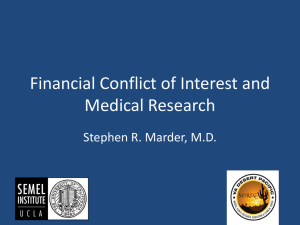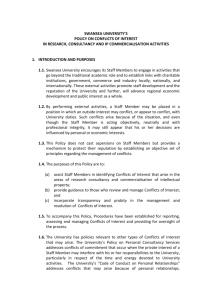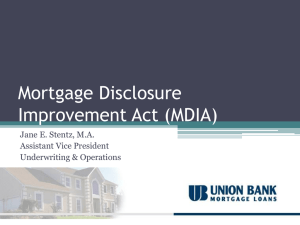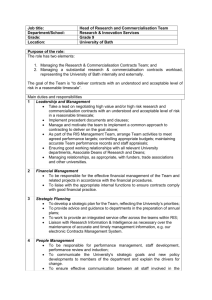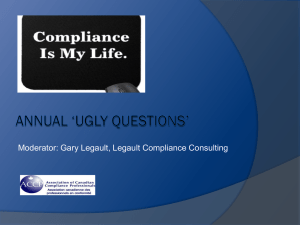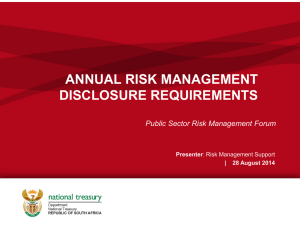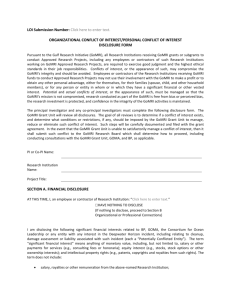SWANSEA UNIVERSITY*S
advertisement
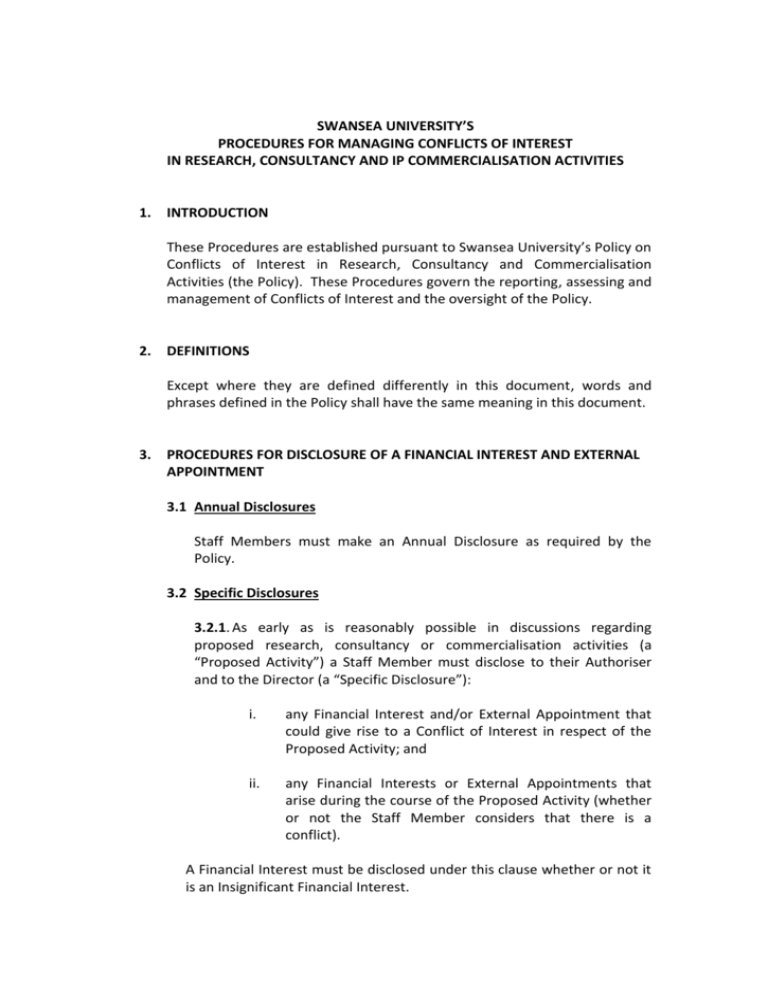
SWANSEA UNIVERSITY’S PROCEDURES FOR MANAGING CONFLICTS OF INTEREST IN RESEARCH, CONSULTANCY AND IP COMMERCIALISATION ACTIVITIES 1. INTRODUCTION These Procedures are established pursuant to Swansea University’s Policy on Conflicts of Interest in Research, Consultancy and Commercialisation Activities (the Policy). These Procedures govern the reporting, assessing and management of Conflicts of Interest and the oversight of the Policy. 2. DEFINITIONS Except where they are defined differently in this document, words and phrases defined in the Policy shall have the same meaning in this document. 3. PROCEDURES FOR DISCLOSURE OF A FINANCIAL INTEREST AND EXTERNAL APPOINTMENT 3.1 Annual Disclosures Staff Members must make an Annual Disclosure as required by the Policy. 3.2 Specific Disclosures 3.2.1. As early as is reasonably possible in discussions regarding proposed research, consultancy or commercialisation activities (a “Proposed Activity”) a Staff Member must disclose to their Authoriser and to the Director (a “Specific Disclosure”): i. any Financial Interest and/or External Appointment that could give rise to a Conflict of Interest in respect of the Proposed Activity; and ii. any Financial Interests or External Appointments that arise during the course of the Proposed Activity (whether or not the Staff Member considers that there is a conflict). A Financial Interest must be disclosed under this clause whether or not it is an Insignificant Financial Interest. 3.2.2 The first Specific Disclosure in respect of a Proposed Activity must describe the nature of the Proposed Activity, the Staff Members and students who will be involved in the Proposed Activity in addition to the disclosures required by Clause 3.2.1. The Specific Disclosure should also suggest how the Conflict of Interest may best be eliminated or otherwise managed. 3.2.3 Save when a Public Disclosure is required, the confidentiality of any Annual Disclosure or Specific Disclosure will be maintained by the University as far as is reasonably possible and disclosed only to those persons whom the University (in its sole discretion) deems to have a bona fide need to know their contents. 3.3 Public Disclosures Staff Members must make Public Disclosures as required by the Policy. 3.4 Consequences of failing to disclose a Conflict of Interest Failure to make a disclosure required under these procedures regarding an actual or perceived Conflict of Interest constitutes a breach of a Staff Member’s contract of employment and may result in disciplinary action, and in serious cases could result in dismissal. In determining whether disciplinary action is appropriate, consideration will be given to the extent to which the Staff Member was aware of the actual or perceived Conflict of Interest and/or made a reasonable decision not to declare it. 4. PROCEDURES FOR THE MANAGEMENT OF CONFLICTS OF INTEREST 4.1 Upon receipt of a Specific Disclosure, the Director shall determine whether any further action is required. Disclosures by themselves are often sufficient to allow the Proposed Activity to which they relate to proceed. 4.2 The Director shall act as soon as reasonably practicable to minimize the delay on the commencement of any Proposed Activity. 4.3 In the evaluation and management of a Conflict of Interest the Director shall consider such factors as: i. ii. How unique is the Staff Member’s capability to perform the research? Is the research of a fundamental or basic nature? iii. i. ii. iii. iv. v. vi. Is the research or consultancy directly related to the financial success of the external entity for which it is proposed to be undertaken? How extensive or limited is the Staff Member’s relationship with the external entity (in terms of other research, consultancy scientific advisory, etc.)? What is the likelihood of any research being distorted? How significant is the Staff Member’s Financial Interest? What control or influence does the Staff Member have in the decisions regarding research activities? Is the research project essential to maintain the continuity of the Undertaking’s research programme? Is the research only for a short period? 4.4 The Director may condition his or her approval of a Proposed Activity by requiring remedial actions, including, for example: i. ii. iii. iv. v. vi. vii. viii. ix. x. xi. xii. Written disclosure of the Financial Interest or External Appointment to other interested parties, including the public, human participants, other researchers, publishers, conference organisers, and public funders co-sponsoring the research or similar research. Reduction of the Staff Member’s involvement in the activity such as prohibiting the Staff Member from acting as principal investigator or from significant decision-making responsibilities. Revisions to the research or consultancy proposal, commercialisation strategy or other affected activities. Monitoring of the research activity by an ad hoc research monitoring committee, a fellow researcher in the project, or other objective Staff Member. Termination of involvement, or reduction in scope of responsibilities of relatives or associates in the activity. Guidelines on ownership or use of resulting Intellectual Property. Divestiture of a Financial Interest. Resignation from relevant External Appointments. Reimbursement to the University of any and all indirect costs incurred as a result of the Proposed Activity and for the use of facilities. Elimination of any restrictions on publication. Establishment of a committee to review data, publications and other issues. Requirement for periodic reports to the University on the research, any related peer-reviewed publications and other related research grants or contracts. xiii. xiv. xv. xvi. Preservation of the data by a neutral individual. Severance or modification of relationships that create the Conflict. Verification of compliance with all other relevant University policies. Any other actions deemed appropriate. 4.5 The Director will maintain a written, confidential record of the disclosure and subsequent related actions and decisions. 4.6. The Director may refer any Conflict to the Registrar for a determination of if, and under what conditions the Proposed Activities should proceed. 4.7 A Staff Member may request that the Registrar review and modify the Director’s decision. 4.8 The Registrar shall have wide discretion to manage any such Conflict and shall report to the Monitoring Panel on any disputes and actions that have been taken. The Registrar may refer any matter to the Conflicts of Interest Panel. 5. PROCEDURES FOR MONITORING THE OPERATION OF THE CONFLICTS OF INTEREST POLICY 5.1 The operation of the Policy will be monitored by a Panel on Conflicts of Interest (the “Monitoring Panel”). The Panel shall be comprised of a lay member of Council, one Pro Vice Chancellor who shall act as Chair, and a faculty representative appointed by the University and College Union. 5.2 The duties of the Panel shall be: 5.2.1 to monitor the operation of these Procedures and the Policy and make recommendations in the light of experience and of good practice guidelines published by outside bodies; 5.2.2 to review Annual Disclosures and alert the Registrar where further clarification or action is required; 5.2.3 to approve, when requested, External Appointments; 5.2.4 to decide on issues which have been referred to it in accordance with the Policy on Conflicts of Interest; and 5.2 5 to establish subpanels which in its judgement are necessary to address specific Colleges, other academic units or departments, or other specific issues. 6. PROCEDURES RELATING TO COMMERCIALISATION ACTIVITIES 6.1 The following procedures will be followed when the University or a subsidiary is to be involved in commercialisation activities. 6.1.1 The review of potential Conflicts of Interest in the University’s commercialisation activities will be coordinated by the Director. 6.1.2 Staff Members who are involved in commercialisation activities must submit a letter to the Director disclosing the details of the commercialisation activities; their involvement with the stakeholders involved in any relevant external entity; the current or proposed Financial Interest of the Staff Member; and details of any intellectual property that the University will be requested to assign or license. 6.1.3 The Director must inform the Registrar of the intent to negotiate with an external entity with which a Staff Member is involved, and the assignment or licensing of any University IP to the external entity. 6.1.4 When possible, the University will not negotiate commercial terms with Staff Members directly. Such negotiations should take place with non-University affiliated individuals who have been appointed to represent the interests of the relevant stakeholder. 6.1.5 The licensing or assignment of intellectual property to an external entity must closely adhere to the generic template produced by the Department of Research and Innovation at Swansea University. 6.1.6 The Director may establish an advisory group that will advise, propose or approve commercialisation activities and arrangements. 6.1.7 Upon conclusion of the negotiations over significant matters, the Director will inform the Registrar of the significant terms and conditions of the commercialisation activity, and unless an objection is raised by the Registrar, the Director may continue with the negotiation of contractual issues and other legal documents. 7. PROCEDURES RELATING TO ADMINISTRATIVE STAFF 7.1 Unless formally nominated by the University, no administrative Staff Member (for example, members of the Department, or technology transfer or commercial officers of the Schools) shall hold an External Appointment in an external entity which was established through or connected with his or her work done in the University, or in an external entity which is in a contractual relationship with the University with respect to research, consultancy or commercialisation activities. 7.2 Any administrative Staff Member nominated by the University to serve as the director of an undertaking shall be deemed to accept the nomination in the discharge of his or her duties as a Staff Member of the University and shall not accept any remuneration from the undertaking unless authorized in writing by the Registrar. 7.3 No administrative Staff Member shall hold any shares in, or receive other compensation or remuneration (direct or indirect) from: 7.3.1 an external entity which was established through or which was or is connected with his or her work done in the University; 7.3.2 an external entity in a contractual relationship (for example, a research contract, consultancy contract, a license or assignment of IP) with the University where the administrative Staff Member was or is involved with negotiating or administering the relevant contract, unless such shares have been acquired following the listing of the company on a recognised stock exchange. 8. IMPLEMENTATION AND AMENDMENT 8.1 The Registrar, within the confines of (1) the University’s Charter and any Regulations, Ordnances or other provisions made by Council, (2) the IP Policy, and (3) any directions given by or on behalf of the ViceChancellor, shall have wide discretion to adopt administrative processes, guidance, forms and interpretations necessary to effectively implement the Policy and these Procedures. 8.2 Amendments to these Procedures, which are not inconsistent with the Policy, may be made by the Finance Committee.
